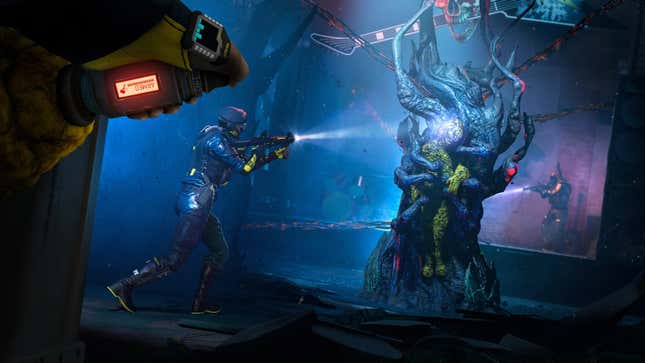
Shortly after Valerie arrived at Ubisoft Montreal in 2018, home to the hit Far Cry and Assassin’s Creed franchises, she says she was sexually harassed and the victim of racist remarks. She reported the incidents, but says nothing was done. The harassment happened again last year, only this time she hoped the company, then in the midst of a very public reckoning with accusations of sexual misconduct and the failure of its workplace culture, might respond differently. But after filing complaints through multiple reporting tools and completing half a dozen interviews with supervisors and HR managers, Valerie never received a resolution to her case. Earlier this year, she decided to resign.
“I wish that I could have continued my Ubisoft journey, but I was really affected by all the harassment, discriminaton, and toxicity I encountered and how it was handled,” she told Kotaku in an interview. “I really hope that the situation will get better for Ubisoft, but they are not there yet.”
Valerie’s story (a pseudonym is being used because the former developer wished to remain anonymous for fear of retaliation) calls into question Ubisoft’s stated commitment to overhauling its HR processes and workplace culture in the wake of last year’s reports. Despite cutting ties with some of those accused publicly, hiring a new head of diversity and inclusion and a chief workplace officer, and bringing in an outside firm, Relais Expert Conseil, to review employee complaints, some current and former employees tell Kotaku that the company’s process for reporting issues still feels like navigating a maze to nowhere.
In July, following the news of a California lawsuit accusing Activision Blizzard of widespread sexual harassment and discrimination among employees, current and former Ubisoft workers formed the group ABetterUbisoft in solidarity, calling for industry-wide change to how companies deal with reports of misconduct. The group shared with Kotaku testimonials from eight current employees and one former one, across different offices, who say that despite the promised changes, Ubisoft has continued to ignore their complaints and repeated calls for greater accountability.
“I gave witness testimony through the Idoko platform directly referencing a case that a coworker had reported already and never heard back, no further questions, nothing,” wrote one. Idoko is one of the anonymous reporting platforms employees now have access to.
“I was fetishized for my race,” wrote another. “Not only were they late to the appointment, they did not properly follow up on my case.”
Others reported issues with discriminatory pay, abusers getting promotions, and being sworn to secrecy about their complaints, each, they say, similarly plagued by a lack of apparent follow-through and transparency in how management handled them.
Last year, to address a lack of trust and faith in its HR department, Ubisoft set up alternative reporting tools. Ubisoft Montreal implemented a new “Respect at Ubisoft” email to which complaints could be sent, and has now added a third-party reporting platform called Whispli. In France, employees have access to Idoku. Some other studios have additional reporting options. The secrecy around these platforms was intended to protect people’s anonymity, but some current and former employees say the opaque process makes it hard to get any answers. And the continued frustration by some at Ubisoft Montreal specifically comes as senior developers and others are reportedly abandoning the roughly 3,000-person mega studio in droves, leaving for competitors and startups as money continues pouring into the booming Canadian game-development scene.
When asked for comment, a spokesperson for Ubisoft told Kotaku it was looking into the questions raised in this story but “didn’t have a comment to share at this time.”

In 2019, Valerie was working on one of Ubisoft Montreal’s big unannounced games (it’s since been canceled), when she says the project’s technical director asked her if she kept sex toys at her desk. On another occasion she says he told her “I will come and slap your butt” the next day at the studio’s big annual Zeitgeist party. “It’s funny, when you smile, you look like someone eating lemon,” Valerie, who is Asian, recalled him telling her at one point, followed by him trying to imitate her face.
She reported the first event to her HR representative, who she says responded by downplaying the chances of anything changing since the technical director in question had been at Ubisoft for decades. According to Valerie, her technology group manager later told her that the complaint would create even more problems for her. They encouraged her to withdraw it, so she did.
In July 2020 Ubisoft announced plans to investigate all reports of misconduct and overhaul its workplace culture, prompting Valerie to report what had previously happened to Relais Expert Conseil. However, since her harassment was limited to three incidents, she says a representative of the firm told her that it did not amount to sexual harassment.
That same year, Valerie had started working on another unannounced game, one which is still in development, but the harassment didn’t stop, and the team dynamics there were more toxic as well. “You Asians, you all look the same,” she recalled her assistant director, who she said would also try to flirt with her, saying. Her new manager, meanwhile, would frequently yell at her when he was upset with something, complimenting her work in private only to tear it down in front of other senior developers, according to her and another former employee who was aware of it at the time.
These were the two people she needed on her side to get a promotion she was seeking, but despite earlier accolades, she said her manager later dismissed her work as insufficient and disappointing. She went on sick leave following that episode, and said her doctor diagnosed her with depression and anxiety from work.
After coming back from sick leave she reached out to Relais Expert Conseil about her situation, calling and sending two emails. The emails never received a response, but weeks later someone from the outside firm did eventually call back telling her the case would not be investigated, but didn’t say why.
Valerie made one final attempt to alert Ubisoft management about the problems she was facing: a resignation email sent in April of this year directly to CEO Yves Guillemot and three others at the company. Based on a copy reviewed by Kotaku, the email explained the harassment and discrimination she had faced, and her frustration and disillusionment over Ubisoft’s failure to address it.
Guillemot did not respond, but Lidwine Vernet Sauer, the newly appointed head of workplace culture, did, writing that she would reopen Valerie’s file and escalate it to Raashi Sikka, the recently appointed VP of global diversity and inclusion. Several interviews followed, including one with both Sauer and Sikka, Valerie said, but ultimately nothing came of them.
Over a year after she first reported her harassment and discrimination to Relais Expert Conseil, she says she’s received no news on the outcome of any investigation, or any explanation about why Ubisoft did or did not choose to take any action in her case.

Valerie wasn’t the only person who had problems with one of the managers on her last project before leaving Ubisoft. Another former developer reported concerns about toxic behavior as well, accusing the same person of belittling and bullying members of the team.
They tried going through the “Respect at Ubisoft” email, and later Whispli, getting different responses from different people each time, but always along the lines that their complaint would be investigated and escalated up the chain of command. Like Valerie, however, they said they never received any updates about the outcome of their report, likening the entire process to the dystopian bureaucracy game, Papers, Please.
“I suddenly began to understand the response some veteran Ubisoft devs gave me when I tried to recruit them to come forward [about similar issues],” they told Kotaku. “It was always some variation of, ‘Same thing happens every few years, I’ve reported X number of things, with witnesses and proof and either nothing was done or person X was promoted or moved.’ It’s sad, and if it’s an intentional way of burying this stuff, it’s working.”
“Considerable progress has been made, and we will continue to work hard with the ambition of becoming an exemplary workplace in the tech industry,” Guillemot declared in a company blog post a few weeks after one employee told French publication Le Telegramme that nothing at Ubisoft had changed. As evidence to the contrary, Guillemot cited recent diverse hires and promotions to leadership positions, new mandatory anti-harassment trainings, and the addition of “new HR processes” and a “fully updated” internal Code of Fair Conduct.
A version of this response has been wheeled out by Ubisoft several times since the original allegations first broke last year. The latest was in July after ABetterUbisoft sent its open letter to management. “We have heard clearly from this letter that not everyone is confident in the processes that have been put in place to manage misconduct reports,” Guillemot wrote in an email to staff at the time. “This is a top priority for Anika, who continues to ensure they are robust and independent.”
Others inside Ubisoft don’t believe him. At the company’s offices in France, worker representatives on the company’s Social and Economic Committee (French law requires every company of a certain size to have one) have been shut out of the reporting process. According to an email sent to members earlier this month, a copy of which was viewed by Kotaku, the CSE at Ubisoft had long requested to be involved in monitoring incoming complaints and how they were investigated, but was denied by Ubisoft management. Citing concerns over the impartiality of the people involved with the official channels, given their direct ties to management, the CSE group is now instructing members to contact it as well when reporting harassment so that “so we can protect you and ensure that your situations are not ignored.”
“By refusing to include employees in the feedback and decision-making process on harassment, Ubisoft management shows that it never had any intention to do more than communicate to save face,” French Ubisoft employees wrote in a blog post earlier this month. The group also criticized a new attribute, “Act as a role model,” that Ubisoft is adding to annual employee evaluations, arguing that it would be easy for managers to misuse. In a statement to GamesIndustry.biz, chief people officer Anika Grant defended the change, saying it was about “ensuring we compensate people not just on what they accomplish, but also how they accomplish it.”

In his email to staff following ABetterUbisoft’s open letter, Guillemot wrote, “I have always valued free expression at Ubisoft, and I strongly believe this is a key for us.“ But the company still appears adamant about preventing employees from speaking freely about their complaints with the outside world.
“As you know, your experiences and the information you have access to while working in the studio are privileged and cannot be shared outside of the studio,” Ubisoft Montreal director Christophe Derennes—who replaced former Ubisoft Canada CEO Yannis Mallat amid last year’s reckoning and is Guillemot’s cousin—wrote in an email to staff in June, a copy of which was obtained by Kotaku.
“Obviously, this does not prevent journalists from trying to contact you. If that happens, we ask that you forward the request to our Media Relations Officer,” wrote Derennes. “It’s the right thing to do, but it’s also a commitment you made under the Code of Conduct, the Anti-Leak Policy and your employment contract.”
Ubisoft has yet to set up a meeting to discuss worker demands, an ABetterUbisoft representative told Kotaku. The group was hoping they might be discussed during a series of remote presentations made across the company last week by Sikka and Grant, which included Q&A sessions. Instead, two current employees described the presentations as disappointing and emblematic of a company looking to move forward rather than clean house. “[They] weren’t addressing anything properly and basically saying ‘trust the process,’” one told Kotaku.
“No matter how the head of Ubisoft wants things to change, the problems we’ll run into for a long time is that people in power—directors, managers—are from the old guard, so even with the best intentions issues are still happening,” one current Ubisoft Montreal developer told Kotaku. “People who think in the same way as the one already in power advance over the others.”
Another current employee was more optimistic. “They are trying,” they said. “I am exhausted but hopeful.”



